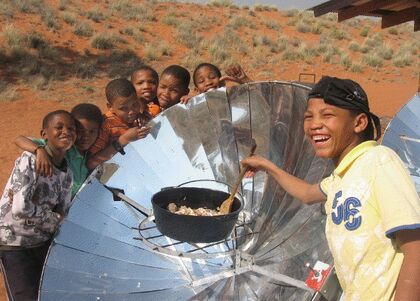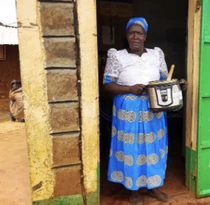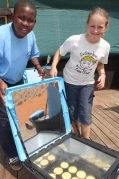Paul Hedrick (talk | contribs) m (→Reports) Tag: sourceedit |
Tom Sponheim (talk | contribs) mNo edit summary |
||
| (47 intermediate revisions by 4 users not shown) | |||
| Line 1: | Line 1: | ||
{{GoogleTranslateLinks}} |
{{GoogleTranslateLinks}} |
||
| − | {{Updated| |
+ | {{Updated|8|26|19}} |
<table cellspacing="2"> |
<table cellspacing="2"> |
||
<tr> |
<tr> |
||
<td valign="top" width="45%">__TOC__</td> |
<td valign="top" width="45%">__TOC__</td> |
||
| − | <td valign="top" width="55%" style="padding: |
+ | <td valign="top" width="55%" style="padding:15px;"> |
| − | [[File:NaDEET_solar_cooking_training_2012,_2-11-13.jpg| |
+ | [[File:NaDEET_solar_cooking_training_2012,_2-11-13.jpg|420px|none|]] |
| + | Young [[NaDEET]] students learning to use a [[parabolic solar cooker]]. |
||
</table> |
</table> |
||
==Events== |
==Events== |
||
| + | {{{{PAGENAME}}Events}} |
||
{{CalendarAndPastEvents}} |
{{CalendarAndPastEvents}} |
||
=={{HeadingNews}}== |
=={{HeadingNews}}== |
||
| + | [[File:NeDEET_2019_NambiRand_Nature_Preserve.jpg|thumb|Some of the 24 young Namibians from eight regions of the country at the Desert Environmental Education Trust Centre (NaDEET) centre in the NamibRand Nature Reserve. July 2019 ''Photo credit: the namibian''|300px]] |
||
| + | *{{NewAug19}}'''August 2019:''' The [[Namib Desert Environmental Education Trust]] (NaDEET) at its center in the NamibRand Nature Reserve this year hosted 24 young Namibians from eight regions of the country to embrace environmental sustainability. The objective of the workshop was to transfer practical knowledge of solar cooking and sustainable living through experimental methods [https://www.namibian.com.na/81276/read/Youth-empowered-on-environmental-sustainability More information...] |
||
| + | *{{NewJan19}}'''January 2019:''' [https://www.namibian.com.na/181092/archive-read/Solar-cooking-impresses-workshop-participants Solar cooking impresses workshop participants] - ''The Namibian'' |
||
| + | *{{NewOct18}}'''August 2018:''' [https://allafrica.com/stories/201808220399.html Namibia: Learning How to Cook On Solar in Five Days] - ''allAfrica'' |
||
| + | [[File:NaDeet_celebration_of_project,_12-13-16.png|thumb|300px|[[NaDEET]] held a celebration at the close of their three year sustainability project. - ''Photo credit: NaDEET'']] |
||
| + | *{{NewDec16}}'''December 2016: Sustainability project comes to a close in Nambia''' - [[NaDEET]] held a celebration at the close of their three year sustainability project at the end of October. Participants in the program came from the communities of Rietoog, Uibes and Gochas. The project provided training in many aspects of sustainable living, with solar cooking an important component of their comprehensive approach. [http://www.nadeet.org More information...] |
||
| + | |||
| + | *{{NewJan16}}'''January 2016:''' NADEET reports that in 2015 it distributed 122 solar cookers and served 200,000 solar-cooked meals. |
||
| + | |||
[[File:NaDEET_user_survey,_11-13-13.jpg|right|140px]] |
[[File:NaDEET_user_survey,_11-13-13.jpg|right|140px]] |
||
*'''November 2013: Informal survey leads to new directions''' - Project leaders surveyed young workshop participants and community leaders regarding their satisfaction with solar cooking. Overall, both urban and rural based learners viewed solar cooking positively despite perceived disadvantages around slower cooking times amongst urban users and the financial ability to acquire cookers for rural users. Both groups showed a good understanding of the benefits to the environment. |
*'''November 2013: Informal survey leads to new directions''' - Project leaders surveyed young workshop participants and community leaders regarding their satisfaction with solar cooking. Overall, both urban and rural based learners viewed solar cooking positively despite perceived disadvantages around slower cooking times amongst urban users and the financial ability to acquire cookers for rural users. Both groups showed a good understanding of the benefits to the environment. |
||
| Line 17: | Line 28: | ||
[[File:NaDEET_solar_cooking_training_2012,_2-11-13.jpg|thumb|300px|Young [[NaDEET]] students learning to use a [[parabolic solar cooker]].]] |
[[File:NaDEET_solar_cooking_training_2012,_2-11-13.jpg|thumb|300px|Young [[NaDEET]] students learning to use a [[parabolic solar cooker]].]] |
||
| − | *'''February 2013: More from Nailoke’s Solar House''' - |
+ | *'''February 2013: More from Nailoke’s Solar House''' - Nailoke Niingungo summarizes the approach of the organization, [[NaDEET]], used for solar cooking promotion in [[Namibia]]. Morning meals are cooking over [[Fuel-efficient woodstove]]s and meals later in the day are prepared with solar cookers. [[haybasket|Hay baskets]] are primarily used for keeping food warm until dinner is served. Beside instruction in using solar cookers, workshop participants are trained in their construction as well. They are also shown how to make recycled paper firebricks for use in the [[Rocket stove]]s. Moreover, program attendees receive vouchers for purchasing solar cookers at a reduced price if they show they have successfully completed the training program. |
| − | *'''November 2012: GloboSol annual report: Namibia - Nailoke’s Solar House''' - |
+ | *'''November 2012: GloboSol annual report: Namibia - Nailoke’s Solar House''' - Nailoke Niingungo is a woman who puts considerable effort into improving living conditions and protecting the environment in the area where she lives in [[Namibia]]. Her means to do that is to promote solar ovens by partnering with [[GloboSol]]. To make people aware of solar cooking, she bakes bread on a daily basis and roasts peanuts, which are then sold, providing a modest income. Currently, the solar ovens are built at two different locations, which is working, but needs to be improved. Likewise, the sales of the solar ovens have not yet met their expectations of the potential market. |
*'''September 2011:''' The [[Namib Desert Environmental Education Trust]] (NaDEET), a non-profit Namibian trust geared towards protecting Namibia’s natural environment through educating citizens how to live sustainably, has to date donated about 70 solar cookers to almost 150 people in the South. In 2010 NaDEET expanded its youth orientated programmes to include adults, in order to expand knowledge about solar cooking and related issues, such as climate change. A survey done prior to the training found that 57 per cent of the adults did not know about climate change. Viktoria Keding, director of NaDEET, explained there is a misperception that children are the primary target, whereas adults are just as eager to learn and adapt, especially when the benefits are clear. [http://www.namibian.com.na/indexx.php?archive_id=85725&page_type=archive_story_detail&page=1 Read more...] |
*'''September 2011:''' The [[Namib Desert Environmental Education Trust]] (NaDEET), a non-profit Namibian trust geared towards protecting Namibia’s natural environment through educating citizens how to live sustainably, has to date donated about 70 solar cookers to almost 150 people in the South. In 2010 NaDEET expanded its youth orientated programmes to include adults, in order to expand knowledge about solar cooking and related issues, such as climate change. A survey done prior to the training found that 57 per cent of the adults did not know about climate change. Viktoria Keding, director of NaDEET, explained there is a misperception that children are the primary target, whereas adults are just as eager to learn and adapt, especially when the benefits are clear. [http://www.namibian.com.na/indexx.php?archive_id=85725&page_type=archive_story_detail&page=1 Read more...] |
||
| − | *'''April 2011:''' |
+ | *'''April 2011:''' Jon Maravelias of the NGO, [[NaDEET]], traveled to five communities in [[Namibia]] to evaluate the results of previous solar cooking workshops conducted by the organization. The areas are mostly rural and poor. He reports; In general, it seemed that the poorer you were, the more you relied on solar cooking since it meant you did not need to collect firewood for the day. He visited several women who use the solar cooker and fuel-efficient stoves to heat their bath water and to cook all of their meals. The most successful communities were the ones with a traditional power structure. Both the communities of Maltahohe and Bethanien were under the leadership of two elder women. NaDEET also has been active in planting new trees in this mostly barren area. |
*'''July 2010:''' Students learn how to cook on solar. The final 20 students from a group of 60 received their certificates last week for successfully completing a training course on the use of alternative energy to help rural communities create conditions for sustainable living in [[Namibia]]. The project is possible through NaDEET, an NGO funded from the Small Grants Programme of the Global Environment Facility. |
*'''July 2010:''' Students learn how to cook on solar. The final 20 students from a group of 60 received their certificates last week for successfully completing a training course on the use of alternative energy to help rural communities create conditions for sustainable living in [[Namibia]]. The project is possible through NaDEET, an NGO funded from the Small Grants Programme of the Global Environment Facility. |
||
*'''June 2010:''' The Ministry of Mines and Energy is promoting and encouraging communities to make use of solar stoves and cookers to save firewood, electricity and other fuels. Speaking recently in Windhoek, Selma-Penna Utonih, Director of Energy in the Ministry of Mines, commended the Dr. Frans Aupa Indongo Primary School for its efforts working with students and their parents distributing solar cookers. |
*'''June 2010:''' The Ministry of Mines and Energy is promoting and encouraging communities to make use of solar stoves and cookers to save firewood, electricity and other fuels. Speaking recently in Windhoek, Selma-Penna Utonih, Director of Energy in the Ministry of Mines, commended the Dr. Frans Aupa Indongo Primary School for its efforts working with students and their parents distributing solar cookers. |
||
| Line 34: | Line 45: | ||
=={{HeadingHistory}}== |
=={{HeadingHistory}}== |
||
| + | {{SubSection|Workshops by Harald Schutt}} |
||
| + | At a meeting in Varese, [[Italy]], in 1999, Harald Schutt, a solar cooking advocate, described his work of constructing and disseminating solar stoves in Namibia over a period of eight years in the 1990s. Mr. Schutt was first introduced to solar cooking in a workshop in Germany given by representatives of the [[ULOG|ULOG group]]. Following that, he worked in Namibia, initially in a refugee camp and later in settled communities, teaching Namibians how to build wooden box cookers and how to use the devices. Female carpentry-trainers were taught the techniques of making the oven, and considerable experimentation was done to keep costs low while still producing quality devices. |
||
| + | After his work in Namibia concluded, Mr. Schutt's synthesized what he learned into the following elements of a successful solar cooking project: |
||
| − | A workshop was presented at the Varese, Italy, meeting in 1999 by a solar |
||
| + | *Use a solar stove yourself before introducing the technology to others |
||
| − | promoter, Harald Schutt. He described the construction and dissemination of solar stoves |
||
| + | *Use schools as teaching sites |
||
| − | in Namibia over a period of 8 years in the 1990s. His initial exposure was provided in a |
||
| + | *Create social clubs around solar cooking |
||
| − | workshop in Germany presented by representatives of the ULOG group (see description |
||
| + | *Train builders to create high-quality stoves |
||
| − | in the section on Multi-National Promoters). Following that, Mr. Schutt worked in |
||
| ⚫ | |||
| − | Namibia, initially in a refugee camp and later in settled communities, teaching |
||
| − | Namibians how to build a wooden box cooker and how to use the device. Female |
||
| − | carpentry-trainers were taught the techniques of making the overt, and considerable |
||
| − | experimentation was done to keep costs low while still producing quality devices. |
||
| − | |||
| − | This solar promoter has distilled lessons he has learned in many years. His view |
||
| − | include the following: use a solar stove yourself, use schools as teaching sites, create |
||
| − | social clubs around solar cooking, train builders of stoves of high quality; launch |
||
| ⚫ | |||
| − | supermarkets, clinics, and schools (Varese, p. 215). |
||
| − | Nothing is known however about the outcome of this work in Namibia. |
||
| − | |||
{{ArchivedPagesForHistory}} |
{{ArchivedPagesForHistory}} |
||
=={{HeadingClimateCulture}}== |
=={{HeadingClimateCulture}}== |
||
| ⚫ | |||
| − | *{{WikipediaClimate|https://en.wikipedia.org/wiki/ |
+ | *{{WikipediaClimate|https://en.wikipedia.org/wiki/Geography_of_Namibia#Climate}} |
| − | |||
| + | *{{NewAug19}}{{EnergySituationEnergypedia}} |
||
| ⚫ | |||
*[[Africa#Southern_Africa|Discussion of southern Africa's suitability for solar cooking]]<br> |
*[[Africa#Southern_Africa|Discussion of southern Africa's suitability for solar cooking]]<br> |
||
*[[Solar cooker dissemination and cultural variables]] |
*[[Solar cooker dissemination and cultural variables]] |
||
==Resources== |
==Resources== |
||
| + | {{ContinentInfo|Africa}} |
||
===Handbooks=== |
===Handbooks=== |
||
| + | *{{NewJan16}}'''2015:''' [[Media:Its_Time_to_be_Efficient_-_NaDEET_2015.pdf|NaDEET's manual showing how to build all sorts of energy-saving devices including a solar cooker and a fuel-efficient woodstove]] (English and Afrikaans) - ''[[Namib Desert Environmental Education Trust]]'' |
||
| + | |||
*'''2014:''' [http://www.nadeet.org/sites/default/files/pdf/educational_material/It%27s%20Time%20to%20Solar%20Cook.pdf It's Time to Solar Cook - A Guide and Cookbook] - ''NaDEET'', ''Viktoria Keding & Elizabeth Lammert'' |
*'''2014:''' [http://www.nadeet.org/sites/default/files/pdf/educational_material/It%27s%20Time%20to%20Solar%20Cook.pdf It's Time to Solar Cook - A Guide and Cookbook] - ''NaDEET'', ''Viktoria Keding & Elizabeth Lammert'' |
||
| + | |||
===Reports=== |
===Reports=== |
||
*'''1995:''' [http://solarcooking.org/research/fi/petri.htm Solar Cookers for Use in Nambia] - ''Petri Konttinen'' |
*'''1995:''' [http://solarcooking.org/research/fi/petri.htm Solar Cookers for Use in Nambia] - ''Petri Konttinen'' |
||
| + | |||
| + | ==={{HeadingProjectEvals}}=== |
||
| + | *{{NewJan17}}'''April 2011:''' [http://archive.is/20121225183554/emugoldalumni.wordpress.com/2011/05/02/global-gold-alternative-cooking-technology Namib Desert Environmental Education Trust (NaDEET) revisits five communities in Namibia that had received solar cooking training in 2009 - 2010.] - Jon Maravelias, Development Associate at [[NaDEET]], visits areas in [[Namibia]] where he helped distribute solar cookers and train the recipients in their use and plant trees to combat the rampant deforestation in the area. |
||
===Articles in the media=== |
===Articles in the media=== |
||
| + | *{{NewJan19}}'''January 2019:''' [https://www.namibian.com.na/181092/archive-read/Solar-cooking-impresses-workshop-participants Solar cooking impresses workshop participants] - ''The Namibian'' |
||
| + | *{{NewAug18}}'''August 2018:''' [https://allafrica.com/stories/201808220399.html Namibia: Learning How to Cook On Solar in Five Days] - ''allAfrica'' |
||
*'''September 2011:''' [http://www.namibian.com.na/indexx.php?archive_id=85725&page_type=archive_story_detail&page=1 Shining a light on solar cooking] - ''The Namibian'' |
*'''September 2011:''' [http://www.namibian.com.na/indexx.php?archive_id=85725&page_type=archive_story_detail&page=1 Shining a light on solar cooking] - ''The Namibian'' |
||
*'''February 2010:''' [http://allafrica.com/stories/201002160177.html Solar Stoves Cooking Up a Storm Countrywide] - ''The Namibian'' |
*'''February 2010:''' [http://allafrica.com/stories/201002160177.html Solar Stoves Cooking Up a Storm Countrywide] - ''The Namibian'' |
||
| − | *'''September 2008:''' [http://allafrica.com/stories/200809050969.html Namibia: Nation Switches On to Solar Power] - ''The |
+ | *'''September 2008:''' [http://allafrica.com/stories/200809050969.html Namibia: Nation Switches On to Solar Power] - ''The Namibian'' |
*'''May 2007:''' [http://allafrica.com/stories/200705180301.html Namibia: Solar Baking Oven Would Save Wood, Environment and Electricity] - ''New Era'' |
*'''May 2007:''' [http://allafrica.com/stories/200705180301.html Namibia: Solar Baking Oven Would Save Wood, Environment and Electricity] - ''New Era'' |
||
Revision as of 04:55, 27 August 2019
|
Last edited: 26 August 2019
|
|
Young NaDEET students learning to use a parabolic solar cooker. |
Events
Featured international events
- 4-6 June 2024 (Bridgetown, Barbados): Sustainable Energy for All Global Forum - The event will be co-hosted by Sustainable Energy for All (SEforALL) and the government of Barbados. It is a platform for government, business and finance leaders, entrepreneurs, and youth and community representatives from around the world to come together to broker new partnerships, spur new investment, and address challenges at the nexus of energy, climate, and development. More information...
Online events
- NEW: Thursday, 18 April 2024 (2:30pm-3:15pm EDT), (Washington, D.C., USA): ESMAP Spring Meetings Knowledge Café: Clean Cooking at the Heart of Energy Access - Join ESMAP for this exciting knowledge-sharing opportunity, which will showcase the role of clean cooking as a key part of energy access and energy transition. Presentations by René van Hell, Director of Inclusive Growth, Ministry of Foreign Affair, Netherlands, Dr. Kandeh Yumkella Chairman, Presidential Initiative on Climate, Renewable Energy and Food Security, Sierra Leone, and Chandrasekar Govindarajalu, Practice Manager, ESMAP, World Bank. In-person attendance at World Bank Atrium, MC Front Lobby is for Spring Meetings registrants only. However, you can watch the event online
Requests for proposal
- Decentralized Renewable Energy Solutions utilizing Solar and Bio-Energy - Sustainable Energy Technologies and Assessments of ScienceDirect, is requesting guest-author submissions. The special issue, VSI: DRES is devoted to publishing research articles reporting the innovative designs and design interventions in solar thermal and bio-energy for decentralized energy systems (DES). It includes i) new and novel designs of prototype or commercial devices and technologies, their development, modeling and simulations and experimental validation; ii) innovations for processes, techniques, utilization, and applications; iii) novel use of materials for improving efficiency, performance, techno-economic feasibility, and sustainability and iv) research findings addressing the socio-economic, health and safety impacts, and life cycle assessments leading to proposing novel devices for DES. The Deadline for submission is 31 July 2024. More submittal information...
- See also: Global Calendar of Events and past events in Namibia
News
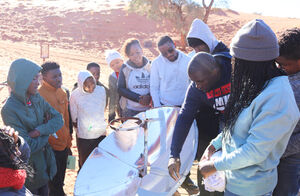
Some of the 24 young Namibians from eight regions of the country at the Desert Environmental Education Trust Centre (NaDEET) centre in the NamibRand Nature Reserve. July 2019 Photo credit: the namibian
- August 2019: The Namib Desert Environmental Education Trust (NaDEET) at its center in the NamibRand Nature Reserve this year hosted 24 young Namibians from eight regions of the country to embrace environmental sustainability. The objective of the workshop was to transfer practical knowledge of solar cooking and sustainable living through experimental methods More information...
- January 2019: Solar cooking impresses workshop participants - The Namibian
- August 2018: Namibia: Learning How to Cook On Solar in Five Days - allAfrica
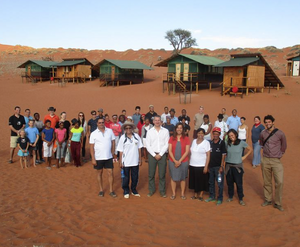
NaDEET held a celebration at the close of their three year sustainability project. - Photo credit: NaDEET
- December 2016: Sustainability project comes to a close in Nambia - NaDEET held a celebration at the close of their three year sustainability project at the end of October. Participants in the program came from the communities of Rietoog, Uibes and Gochas. The project provided training in many aspects of sustainable living, with solar cooking an important component of their comprehensive approach. More information...
- January 2016: NADEET reports that in 2015 it distributed 122 solar cookers and served 200,000 solar-cooked meals.
- November 2013: Informal survey leads to new directions - Project leaders surveyed young workshop participants and community leaders regarding their satisfaction with solar cooking. Overall, both urban and rural based learners viewed solar cooking positively despite perceived disadvantages around slower cooking times amongst urban users and the financial ability to acquire cookers for rural users. Both groups showed a good understanding of the benefits to the environment.
- September 2013: To increase ownership of alternative energy equipment in rural communities in southern Namibia, the Namib Desert Environmental Education Trust (NaDEET) has this year invited representatives from the Rietoog, Aranos and Maltahöhe communities as well as students from the Agricultural Training Centre in Krumhuk to attend the NaDEET environmental education program. Sixty-eight participants earned solar cookers through NaDEET’s voucher testing system. This year one hundred parabolic solar cookers have been distributed to communities.
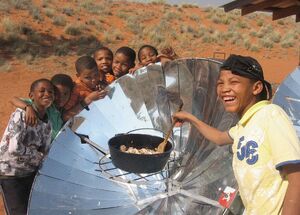
Young NaDEET students learning to use a parabolic solar cooker.
- February 2013: More from Nailoke’s Solar House - Nailoke Niingungo summarizes the approach of the organization, NaDEET, used for solar cooking promotion in Namibia. Morning meals are cooking over Fuel-efficient woodstoves and meals later in the day are prepared with solar cookers. Hay baskets are primarily used for keeping food warm until dinner is served. Beside instruction in using solar cookers, workshop participants are trained in their construction as well. They are also shown how to make recycled paper firebricks for use in the Rocket stoves. Moreover, program attendees receive vouchers for purchasing solar cookers at a reduced price if they show they have successfully completed the training program.
- November 2012: GloboSol annual report: Namibia - Nailoke’s Solar House - Nailoke Niingungo is a woman who puts considerable effort into improving living conditions and protecting the environment in the area where she lives in Namibia. Her means to do that is to promote solar ovens by partnering with GloboSol. To make people aware of solar cooking, she bakes bread on a daily basis and roasts peanuts, which are then sold, providing a modest income. Currently, the solar ovens are built at two different locations, which is working, but needs to be improved. Likewise, the sales of the solar ovens have not yet met their expectations of the potential market.
- September 2011: The Namib Desert Environmental Education Trust (NaDEET), a non-profit Namibian trust geared towards protecting Namibia’s natural environment through educating citizens how to live sustainably, has to date donated about 70 solar cookers to almost 150 people in the South. In 2010 NaDEET expanded its youth orientated programmes to include adults, in order to expand knowledge about solar cooking and related issues, such as climate change. A survey done prior to the training found that 57 per cent of the adults did not know about climate change. Viktoria Keding, director of NaDEET, explained there is a misperception that children are the primary target, whereas adults are just as eager to learn and adapt, especially when the benefits are clear. Read more...
- April 2011: Jon Maravelias of the NGO, NaDEET, traveled to five communities in Namibia to evaluate the results of previous solar cooking workshops conducted by the organization. The areas are mostly rural and poor. He reports; In general, it seemed that the poorer you were, the more you relied on solar cooking since it meant you did not need to collect firewood for the day. He visited several women who use the solar cooker and fuel-efficient stoves to heat their bath water and to cook all of their meals. The most successful communities were the ones with a traditional power structure. Both the communities of Maltahohe and Bethanien were under the leadership of two elder women. NaDEET also has been active in planting new trees in this mostly barren area.
- July 2010: Students learn how to cook on solar. The final 20 students from a group of 60 received their certificates last week for successfully completing a training course on the use of alternative energy to help rural communities create conditions for sustainable living in Namibia. The project is possible through NaDEET, an NGO funded from the Small Grants Programme of the Global Environment Facility.
- June 2010: The Ministry of Mines and Energy is promoting and encouraging communities to make use of solar stoves and cookers to save firewood, electricity and other fuels. Speaking recently in Windhoek, Selma-Penna Utonih, Director of Energy in the Ministry of Mines, commended the Dr. Frans Aupa Indongo Primary School for its efforts working with students and their parents distributing solar cookers.
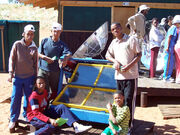
Peace Corps volunteer and friends bake bread in Nadeet.
- January 2009: Miriam Kashia reports that 60 recent Peace Corps volunteers were provided with solar cookers manufactured in Namibia. They each took these to their villages for use there. More information.
- May 2007: Namibia: Solar Baking Oven Would Save Wood, Environment and Electricity - New Era
- August 2006: A solar cooker project in Ongwediva won an "Inspiration Lives in Africa" award from Namibia's Standard Bank in April. Ongwediva's Solar Stove Project, now in its eighth year, introduces solar cooking to women to combat deforestation and to provide employment opportunities like solar bakeries and catering. The award, worth 50,000 Namibian dollars, will be used to increase marketing activities.
History
At a meeting in Varese, Italy, in 1999, Harald Schutt, a solar cooking advocate, described his work of constructing and disseminating solar stoves in Namibia over a period of eight years in the 1990s. Mr. Schutt was first introduced to solar cooking in a workshop in Germany given by representatives of the ULOG group. Following that, he worked in Namibia, initially in a refugee camp and later in settled communities, teaching Namibians how to build wooden box cookers and how to use the devices. Female carpentry-trainers were taught the techniques of making the oven, and considerable experimentation was done to keep costs low while still producing quality devices.
After his work in Namibia concluded, Mr. Schutt's synthesized what he learned into the following elements of a successful solar cooking project:
- Use a solar stove yourself before introducing the technology to others
- Use schools as teaching sites
- Create social clubs around solar cooking
- Train builders to create high-quality stoves
- Launch publicity campaigns to raise awareness, including demonstrations at sports events, supermarkets, clinics, and schools (Varese, p. 215)
- Main article: History of solar cooking
Archived articles
Climate and culture
See also
- The climate of Namibia - Wikipedia
- Namibia Energy Situation - Energypedia
- Discussion of southern Africa's suitability for solar cooking
- Solar cooker dissemination and cultural variables
Resources
Possible funding
Handbooks
- 2015: NaDEET's manual showing how to build all sorts of energy-saving devices including a solar cooker and a fuel-efficient woodstove (English and Afrikaans) - Namib Desert Environmental Education Trust
- 2014: It's Time to Solar Cook - A Guide and Cookbook - NaDEET, Viktoria Keding & Elizabeth Lammert
Reports
- 1995: Solar Cookers for Use in Nambia - Petri Konttinen
Project evaluations
- April 2011: Namib Desert Environmental Education Trust (NaDEET) revisits five communities in Namibia that had received solar cooking training in 2009 - 2010. - Jon Maravelias, Development Associate at NaDEET, visits areas in Namibia where he helped distribute solar cookers and train the recipients in their use and plant trees to combat the rampant deforestation in the area.
Articles in the media
- January 2019: Solar cooking impresses workshop participants - The Namibian
- August 2018: Namibia: Learning How to Cook On Solar in Five Days - allAfrica
- September 2011: Shining a light on solar cooking - The Namibian
- February 2010: Solar Stoves Cooking Up a Storm Countrywide - The Namibian
- September 2008: Namibia: Nation Switches On to Solar Power - The Namibian
- May 2007: Namibia: Solar Baking Oven Would Save Wood, Environment and Electricity - New Era
Contacts
The entities listed below are either based in Namibia, or have established solar cooking projects there:
SCI Associates
- Main article: Solar Cookers International Association

